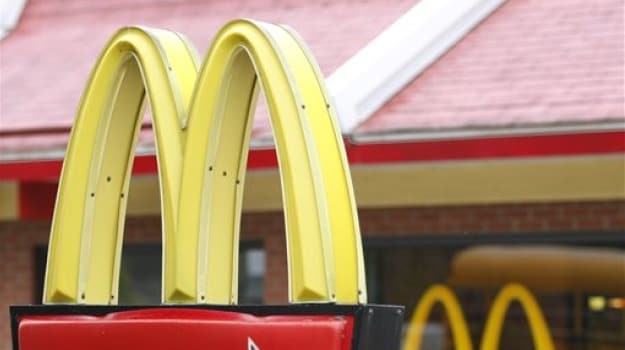McDonald's isn't lovin' it, and it's going to do something about it. The world's largest hamburger chain reported falling earnings and sales for its fourth quarter on Friday and says it is going to take action this year to save money and bring customers back. This includes slowing down new restaurant openings in some markets.
It's also making changes to its menu and looking to offer customers more options to customize their burgers. But the fast-food giant said its problems won't be fixed overnight: It expects sales to remain weak through the first half of this year while it deals with the fallout from a food-safety scandal in China, global economic uncertainty and shifting tastes among diners.
While it works to rev sales back up, it's cutting major investments. McDonald's plans just over 1,000 restaurant openings this year, down from 1,300 last year. "We believe this lower level of capital spending is prudent while we work to regain our business momentum and improve the sales and profitability at our more than 36,000 restaurants around the world," Chief Financial Officer Peter Bensen said.
Worldwide sales at locations open at least 13 months edged down 0.9 percent on weaker traffic. In the U.S., the metric declined 1.7 percent on fewer customer visits, tough competition and increased expenses. The performance was an improvement though, as the figure fell 3.3 percent globally and in the U.S. in the third quarter. The Oak Brook, Illinois-based company is dealing with competition on a number of fronts, including convenience stores that are selling more food and smaller chains such as Chipotle that market themselves as being of higher quality.
In hopes of changing negative perceptions about its food, McDonald's recently invited customers to ask questions about its ingredients and sourcing. It also launched a new marketing campaign intended to play up the "loving" in its "I'm Lovin' It" slogan and associate its name with that positive emotion. McDonald's also wants to provide more menu choices at the local level and give customers multiple ways to orderwhether it be at a self-order kiosk or with a mobile device.
"We know that when our customers feel good about us and about eating at McDonald's they visit us more often," President and CEO Don Thompson said during a conference call with investors and analysts. In Europe, sales at locations open at least 13 months fell 1.1 percent, hindered by softness in France and Germany and consumer confidence issues in Russia and the Ukraine.
The figure dropped 4.8 percent in the Asia-Pacific, Middle East and Africa segment because of the impact of a supplier issue on sales and profitability in China, Japan and some other markets. Last year an undercover TV report in China showed one of McDonald's major suppliers repackaging meat that was alleged to be expired. The claim has not been publicly confirmed by the supplier or the government. The plant stopped operations, and many of McDonald's restaurants in the country were left unable to sell burgers, chicken nuggets and other items. The chain's reputation took a hit as well.
Bensen said that the company estimates it will take at least three to six more months for McDonald's business in China to return to a normalized level. The executive said Japan has taken longer to recover. Worsening perceptions are expected to hurt Japan's results for "the foreseeable future."
Overall, for the period ended Dec. 31, McDonald's earned $1.1 billion, or $1.13 per share. That compares with $1.4 billion, or $1.40 per share, a year earlier. Excluding 9 cents per share for a supplier issue, earnings were $1.22 per share.
The results beat Wall Street expectations. The average estimate of analysts surveyed by Zacks Investment Research was for earnings of $1.20 per share. Revenue fell to $6.57 billion from $7.09 billion. This fell short of the $6.73 billion that analysts polled by Zacks expected.








